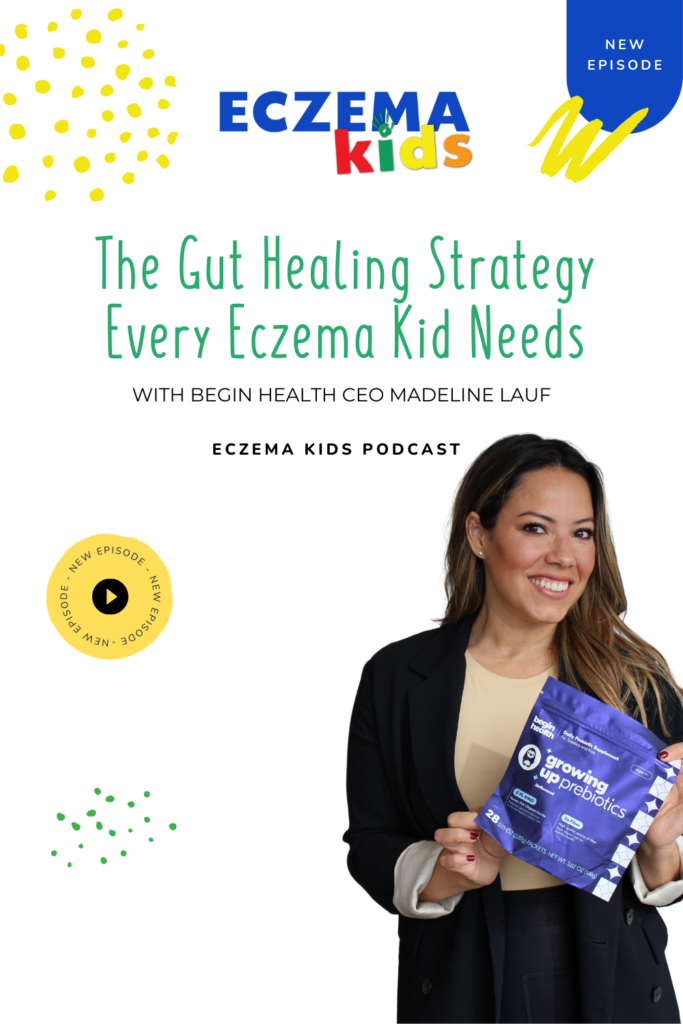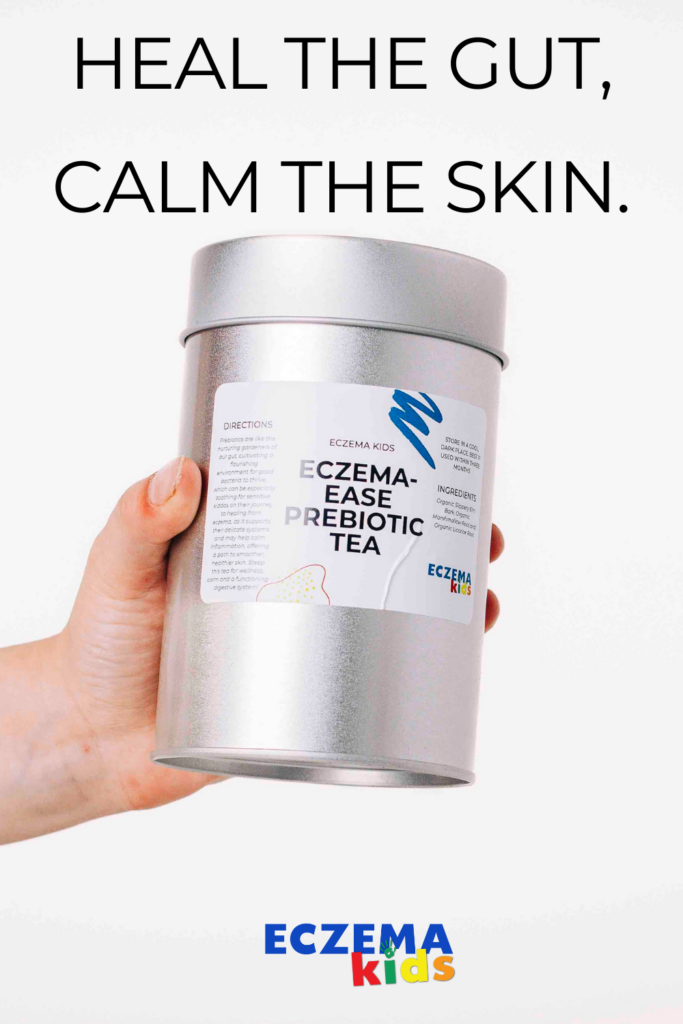By May Zhu, RD at Begin Health
If your kid struggles with eczema, you’re not alone. Eczema, or atopic dermatitis, affects up to
13% of children in the U.S. and is often linked to allergies, asthma, and other immune-related
concerns. As a dietitian, one of the most common questions I hear is: “Can nutrition make a
difference?” The good news is that it can. One of the most promising areas of research is
focused on Human Milk Oligosaccharides (HMOs).
Let’s take a look at what HMOs are, how they support gut and immune health, and why they
might be helpful for kids with eczema.
Listen Below For The Entire Episode on The Eczema Kids Podcast
What Are HMOs?
HMOs are powerful, non-digestible carbohydrates that are naturally found in human breast milk.
They are the third most abundant solid component in breast milk, after lactose and fat. Although
babies can’t digest HMOs directly, these molecules act as prebiotics, which means they help
feed the good bacteria in the gut, especially species like Bifidobacterium infantis and
Bifidobacterium longum.
These beneficial bacteria are important for developing a strong gut microbiome. A healthy gut
microbiome plays a key role in shaping the immune system and keeping inflammation in check,
which is especially important for kids dealing with eczema.
”Make the changes now and be a role model for your kids. If you are doing gut microbiome positive actions, they’re going to want to as well. So it’s never too late to start. You just have to commit and be a role model to your kiddo and join them on a gut health healing positive journey.” -Madeline Lauf of Begin Health
The Gut–Skin Connection and Eczema
You may have heard about the gut–skin connection. It’s the idea that gut health and skin health
are closely linked, and research is backing this up. Children with eczema often have signs of gut
dysbiosis, which is an imbalance in the types and amounts of bacteria in the gut.1
.
When the gut microbiome is balanced, it helps regulate the immune system and reduces the
likelihood of overreacting to common allergens. If the gut is out of balance, though, it can lead to
increased inflammation and a higher risk for allergic responses, including eczema.2
.
How HMOs May Help Support Skin Health
Here are a few ways HMOs may support kids with eczema:
- Feeding beneficial bacteria. HMOs serve as food for friendly gut bacteria like B.infantis, which can help reduce intestinal inflammation and support the integrity of the gut barrier.3
- A stronger gut lining may reduce the chances of immune-triggering substances entering the bloodstream.
- Calming the immune system. HMOs may help shape the immune system by influencing how it reacts to inflammation. Research shows that HMOs can impact cytokines, the signaling proteins that drive allergic and inflammatory responses.4
- Crowding out harmful bacteria. HMOs can also help protect the gut by preventing harmful bacteria from attaching to the gut lining. This can support a healthier immune balance and potentially lower the risk of eczema flares.5
What the Research Says
In a 2022 clinical study, infants who were fed formula supplemented with a blend of HMOs had a
lower incidence of atopic dermatitis than those who received standard formula6. While most
studies focus on infants, the findings are encouraging and suggest a potential role for HMOs in
immune regulation that could support skin health.
Another study found that kids with eczema tend to have fewer bifidobacteria in their gut than
their healthy peers.7 Since HMOs feed bifidobacteria, this points to an opportunity to use prebiotics as part of a supportive nutrition plan for eczema.
How to Include HMOs in Your Child’s Diet
For breastfed infants, HMOs are already present in breast milk. But if your child is formula-fed,
or if they’re a toddler or older, you can still support their gut health through specific prebiotic
ingredients.
One example is Growing Up Prebiotics from Begin Health, a kids’ nutrition company that
makes science-backed prebiotic blends for babies, toddlers, and kids. Their nutrition solutions
include 2′-FL HMOs, the most studied HMO, and are designed to support a healthy gut
environment.
While not a treatment for eczema, they can be a gentle way to help nurture the gut microbiome,
which may benefit skin and immune function over time.
As always, talk with your pediatrician or allergist before introducing new supplements, especially
if your child has food allergies or eczema related to cow’s milk protein.
Final Thoughts
While there is no one-size-fits-all solution for eczema, the connection between gut health and
skin health is becoming clearer. HMOs offer an exciting nutritional strategy that may help kids
with eczema by supporting a balanced gut microbiome and a more resilient immune system.
We still need more research, particularly in older kids, but HMOs are a promising piece of the
eczema puzzle. When combined with other lifestyle strategies like identifying triggers, using
skin-friendly products, and working closely with your healthcare team, HMOs may offer an extra
layer of support for your child’s skin from the inside out.
Looking for More Gut Health Support?
You can try Begin Health’s pre and probiotics for 10% off with code ECZEMAKIDSPODCAST at Begin Health.com. For more gut health positive tools and tactics check out, Gut Health and Eczema, Gut-Healthy Foods To ADD Into Your Eczema Diet and Eczema-Friendly Nutrition Tips for Kids.



FAQ
What are HMOs, and why do they matter for eczema?
HMOs (Human Milk Oligosaccharides) are specialized prebiotics naturally found in breast milk. They feed and fuel beneficial gut bacteria, support the immune system, and help create a protective gut barrier — all of which are key in reducing eczema symptoms and healing from the root.
They’re a powerful addition to a gut-focused healing approach like we use inside the Eczema Elimination Method — a step-by-step system that helps you nourish your child from the inside out.
- Patrick, D. M., et al. (2020). The infant gut microbiome and eczema: A review. Clinical Reviews in Allergy & Immunology, 59(2), 220–229.
↩︎ - West, C. E., et al. (2015). Gut microbiome and allergic disease: New findings. Current Opinion in Clinical Nutrition and Metabolic Care, 18(6), 515–520. ↩︎
- Henrick, B. M., et al. (2021). Bifidobacteria-mediated immune system imprinting in early life. Cell, 184(15), 3884–3898. ↩︎
- Castanys-Muñoz, E., et al. (2016). Human milk oligosaccharides: Structure, functions, and clinical applications in infant nutrition. Advances in Nutrition, 7(3), 487–498. ↩︎
- Donovan, S. M., et al. (2014). Human milk oligosaccharides and their potential roles in health and disease. Nestle Nutrition Institute Workshop Series, 77, 147–155. ↩︎
- Puccio, G., et al. (2022). Effects of infant formula with two HMOs on growth and health outcomes: A randomized controlled trial. Journal of Pediatric Gastroenterology and Nutrition, 75(1), 34–41. ↩︎
- Watanabe, S., et al. (2003). Bifidobacteria and the skin condition of atopic dermatitis patients. Microbial Ecology in Health and Disease, 15(3), 127–130. ↩︎
